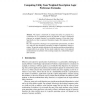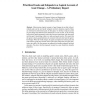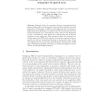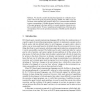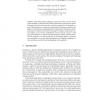145
click to vote
DALT
2009
Springer
15 years 5 months ago
2009
Springer
We propose a framework to compute the utility of a proposal w.r.t. a preference set in a negotiation process. In particular, we refer to preferences expressed as weighted formulas ...
127
click to vote
DALT
2009
Springer
15 years 5 months ago
2009
Springer
The specification and monitoring of conditional obligations and prohibitions with starting points and deadlines is a crucial aspect in the design of open interaction systems. In th...
107
click to vote
DALT
2009
Springer
15 years 5 months ago
2009
Springer
Abstract. We define a framework based on computational logic technology and on a reactive axiomatization of the Event Calculus to formalize the evolution of commitments in time. We...
108
click to vote
DALT
2009
Springer
15 years 5 months ago
2009
Springer
Abstract. Most previous logical accounts of goal change do not deal with prioritized goals and do not handle subgoals and their dynamics properly. Many are restricted to achievemen...
156
click to vote
DALT
2009
Springer
15 years 5 months ago
2009
Springer
Abstract. Virtual characters in games operate in a social context involving other characters and human players. If such socially situated virtual characters are to be considered be...
146
click to vote
DALT
2009
Springer
15 years 6 months ago
2009
Springer
This paper generalises the theory of agent refinement from [1] to multi-agent systems in the presence of new coordination mechanisms extended with real time. The generalisation is ...
112
click to vote
DALT
2009
Springer
15 years 6 months ago
2009
Springer
We continue the work initiated in [1–3], where the acceptance logic, a modal logic for modelling individual and collective acceptances was introduced. This logic is aimed at capt...
145
click to vote
DALT
2009
Springer
15 years 6 months ago
2009
Springer
Abstract. We describe a model-checking based approach to verification of programs written in the agent programming language Dribble. We define a logic (an extension of the branch...
123
click to vote
DALT
2009
Springer
15 years 8 months ago
2009
Springer
What distinguishes multiagent systems from other software systems is their emphasis on the interactions among autonomous, heterogeneous agents. This paper motivates and characteriz...
